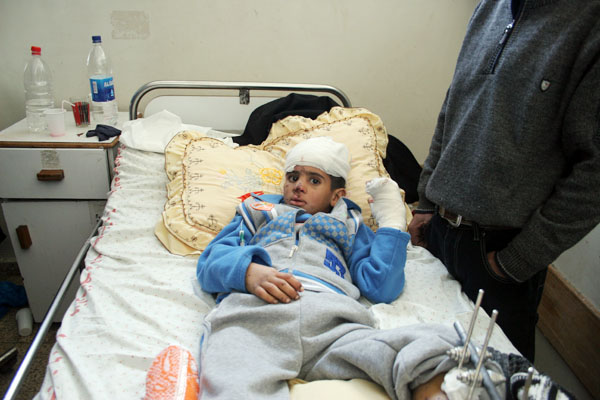Some 1.5 million Palestinians live in the 365sqkm coastal Strip.
"If vaccinations are stopped for one or two weeks this is enough to cause a widespread outbreak of avoidable diseases - such as measles, hepatitis and polio - amongst children and the larger population," WHO health officer Mahmoud Daher told IRIN by telephone from Gaza.
"Efforts have been made for 15 years here to stop these diseases. One or two weeks of an interruption of vaccination programmes can create a risk," warned Daher.
Health sector NGOs in the region are also raising warning flags.
"Serious implications for children"
"Stopping the vaccinations has serious implications for children in Gaza," UNICEF spokesperson Merixie Mercato based in Jerusalem told IRIN.
An estimated one million people in Gaza, including 560,000 children, are living with minimal water and electricity, said Save the Children.
"The breakdown of the water and sewage systems can increase the risk of diarrhoea and other viral diseases, particularly amongst children and the elderly," said WHO’s Daher.
WHO says 34 of the 58 primary healthcare centres managed by the Gaza health ministry were functioning as of 8 January. Those not functioning are all in risky areas.
According to WHO, medical staff in Gaza are either unable to get to work due to the operations of Israeli ground forces or have been redeployed to support hospital staff. As a result, WHO says that all vaccination programmes have been interrupted, antenatal care is not being provided and nutritional surveillance has stopped.
In addition, WHO said: "The epidemiology department is not functioning since no information is flowing from peripheral facilities, hospitals are overwhelmed with casualties, PHC [public health care] centres are not fully functional, and laboratories are not reporting."
ICRC spokesperson Anne Sophie Bonefeld, who is based in Jerusalem, told IRIN: "There are stocks of medicine and medical supplies inside Gaza, but they need to be distributed to hospitals. We need a safe mechanism for the ICRC [International Committee of the Red Cross] and health ministry trucks to deliver the supplies."
"The ICRC has sent 31 trucks of emergency aid to Gaza between 29 December and 8 January," said Bonefeld.
Countless targets have been hit across Gaza since Israel began its bombardment of the enclave on 27 December, in response to rocket fire by Hamas into neighboring Israeli cities.
es/ar/cb
This article was produced by IRIN News while it was part of the United Nations Office for the Coordination of Humanitarian Affairs. Please send queries on copyright or liability to the UN. For more information: https://shop.un.org/rights-permissions





